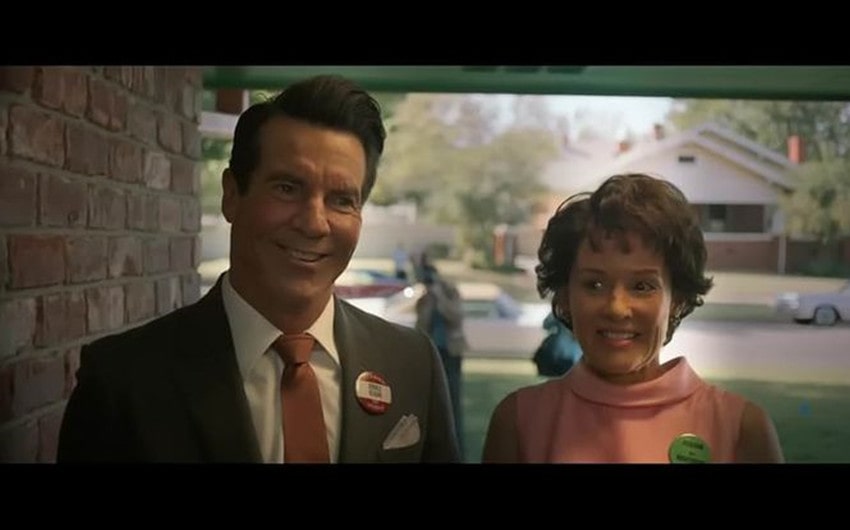Exploring the Reagan Movie: A Tale of Presidential Legacy
Reagan’s extraordinary journey from Hollywood stardom to the White House has fascinated generations, and the film Reagan brings this story to life like never before. In this article, we delve into The Reagan Movie, exploring its portrayal of his iconic life, the themes it highlights, and why it resonates with audiences today.
Whether you’re a fan of history, biographical films, or simply curious about one of America’s most famous leaders, this movie offers a captivating look at a man whose legacy continues to shape the world.
Overview of the Film

Image source: Pinterest
“Reagan” is a 2024 American biographical drama directed by Sean McNamara, with a screenplay by Howard Klausner. The film is based on Paul Kengor’s 2006 book, “The Crusader: Ronald Reagan and the Fall of Communism.”
The narrative chronicles Ronald Reagan’s life, from his early years in small-town America, through his Hollywood career, to his tenure as the 40th President of the United States. The story is uniquely framed through the perspective of Viktor Petrovich, a former KGB agent whose life becomes intertwined with Reagan’s as he rises to prominence.
Dennis Quaid portrays Ronald Reagan, delivering a performance that captures the complexities of Reagan’s character. Penelope Ann Miller co-stars as Nancy Reagan, providing insight into their personal and political partnership. The supporting cast includes Mena Suvari as Jane Wyman, Reagan’s first wife; Kevin Dillon as Jack Warner, the Hollywood studio executive; and Jon Voight as Viktor Petrovich, the KGB agent narrating the tale.
Filming commenced on September 9, 2020, with locations such as Guthrie, Oklahoma, providing authentic backdrops that enhance the film’s historical settings.
“Reagan” was released in theaters across the United States on August 30, 2024. The film has a runtime of 141 minutes and is rated PG-13, making it accessible to a broad audience interested in historical and political dramas.
The film’s musical score, composed by John Coda, complements the narrative, enhancing the emotional and dramatic arcs of Reagan’s life story.
“Reagan” offers a comprehensive portrayal of Ronald Reagan’s journey, providing viewers with an opportunity to reflect on his impact on American history and global politics.
Want a glimpse into the inspiring journey of Ronald Reagan? Watch the trailer for Reagan and step into the story of an actor turned president:
Themes and Key Highlights
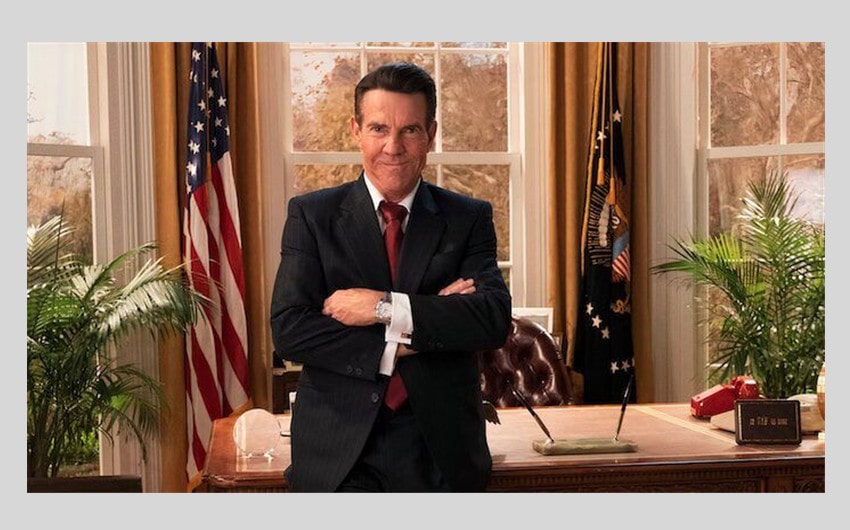
Image source: Pinterest
“Reagan” delves into several pivotal themes that defined Ronald Reagan’s life and presidency:
1. Transformation and Identity
The film captures Reagan’s incredible journey from a Hollywood actor to one of the most influential political figures of the 20th century. It highlights his initial rise to fame as a charismatic on-screen presence and his transition to politics, where he redefined himself as a conservative icon.
The movie underscores how his personal beliefs evolved over time, emphasizing the moments that led to his ideological shift from a liberal Democrat to a staunch Republican. Reagan’s transformation is portrayed as not just political but deeply personal, as he navigated his changing values, ambitions, and public perception.
2. Leadership and Resilience
Reagan’s leadership style is a central theme, showcasing his ability to remain calm under pressure and make decisive choices. The movie dramatizes critical events, such as his handling of the 1981 air traffic controllers’ strike, where he stood firm on his decisions despite widespread backlash.
Another highlight is the attempted assassination in 1981, which the film portrays as a turning point that showcased his resilience and ability to inspire the nation. These moments paint a picture of a leader who was unshakable, even in the face of life-threatening challenges.
3. Cold War Dynamics
The Cold War forms the backdrop of much of the movie, with Reagan’s anti-communist ideology taking center stage. His famous “evil empire” speech and his relationship with Soviet leader Mikhail Gorbachev are pivotal moments, illustrating how he balanced confrontation with diplomacy.
The movie emphasizes his role in the eventual collapse of the Soviet Union, particularly through powerful scenes like his iconic “Tear Down This Wall” speech in Berlin. These moments are depicted as defining milestones in Reagan’s presidency, reflecting his vision of a freer, united world.
4. Personal Relationships
The movie dives into Reagan’s personal life, particularly his deep connection with Nancy Reagan. Their partnership is portrayed as a cornerstone of his life, providing both emotional and political support. Nancy’s unwavering loyalty and influence over Reagan’s decisions are highlighted in tender moments that show their bond beyond the public eye.
Additionally, the movie touches on his relationship with his first wife, Jane Wyman, shedding light on the struggles he faced in balancing his early career ambitions with personal responsibilities.
5. Faith and Morality
Reagan’s Christian faith is presented as a guiding principle in his personal and political life. The film illustrates how his belief in divine providence influenced his policies and his optimistic vision for America.
Key scenes showcase Reagan’s speeches where he draws upon moral and religious values, such as his emphasis on the sanctity of life and freedom. This theme underlines how faith and morality shaped Reagan’s leadership style, offering insight into the convictions that motivated his decisions.
Cast and Performances
The film boasts a notable ensemble cast delivering performances that bring depth to historical figures:
Dennis Quaid as Ronald Reagan
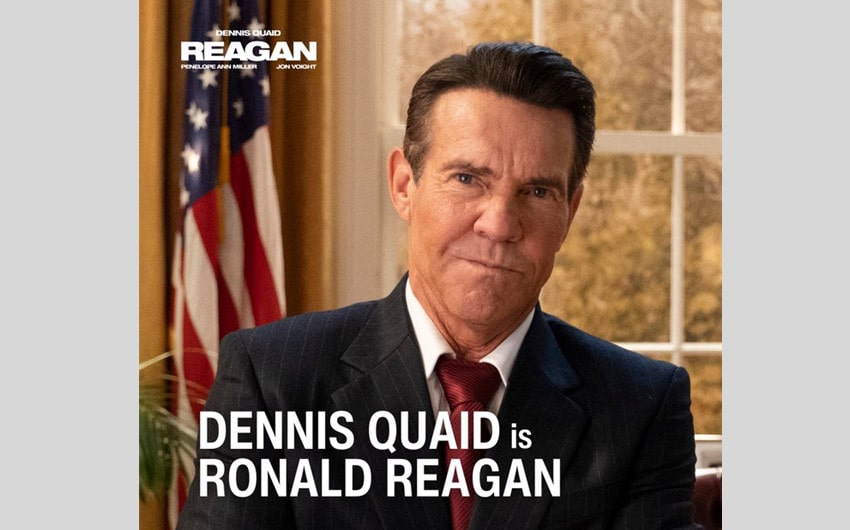
Image source: X
Dennis Quaid takes on the challenging role of Ronald Reagan, portraying the man behind the political persona with nuance and dedication. Quaid captures Reagan’s charisma, optimism, and humor while also delving into the complexities of his personality, including his private struggles and convictions.
From Reagan’s Hollywood years to his time as the 40th President of the United States, Quaid’s performance emphasizes the balance between the charming “Great Communicator” and a deeply determined leader.
Quaid himself has remarked on the responsibility of playing such a pivotal figure, and his effort to humanize Reagan while staying true to historical events is evident throughout the film. Critics have praised his delivery of iconic speeches, including the “Tear Down This Wall” address, for their authenticity and emotional impact.
Penelope Ann Miller as Nancy Reagan
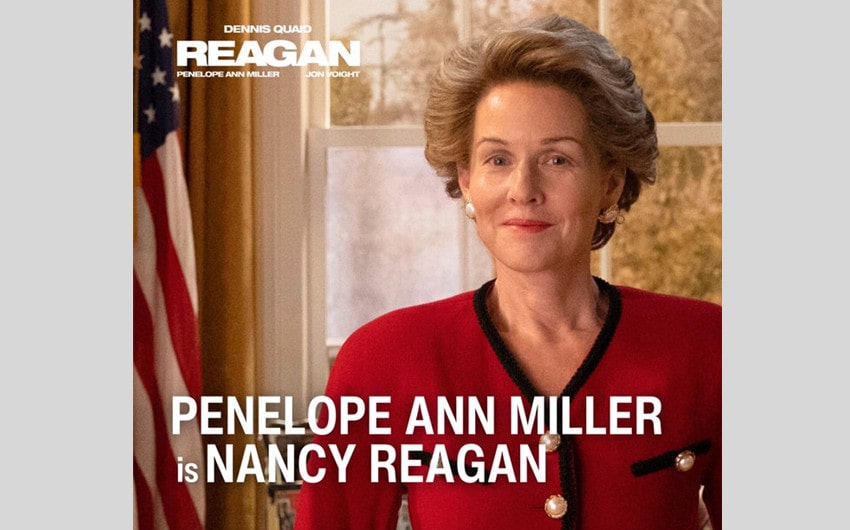
Image source: X
Penelope Ann Miller brings a graceful yet commanding presence to the role of Nancy Reagan. Her portrayal highlights Nancy’s unwavering support for her husband, showing her as not just a First Lady but a key confidante and advisor in Reagan’s life.
Miller’s performance captures the tenderness and resilience of Nancy, particularly during moments of personal and political challenges, such as Reagan’s recovery after the 1981 assassination attempt.
The chemistry between Miller and Quaid is one of the film’s strengths, effectively illustrating the deep bond between Ronald and Nancy Reagan, which was often described as one of the most enduring partnerships in political history.
Jon Voight as Viktor Petrovich
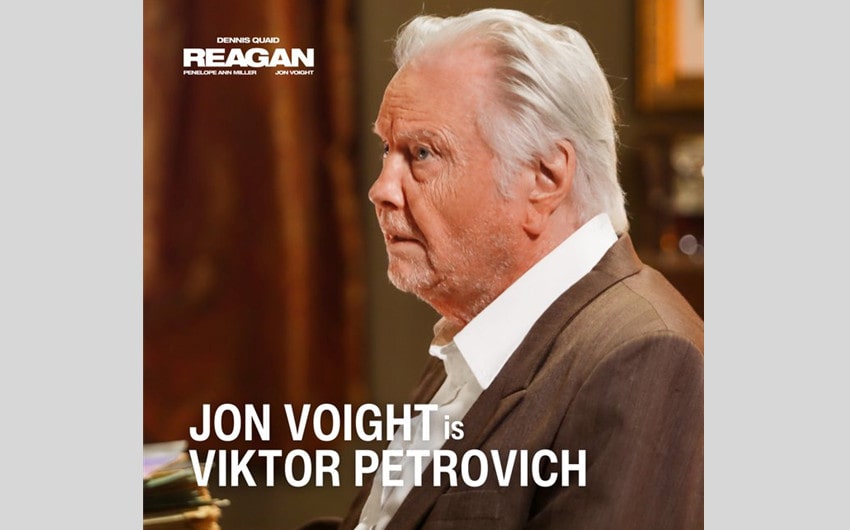
Image source: X
Jon Voight plays Viktor Petrovich, a fictional KGB agent whose perspective serves as the framing device for the film. Through Petrovich’s eyes, the audience gains a unique view of Reagan’s rise to prominence and the geopolitical tensions of the Cold War.
Voight’s narration adds depth and intrigue to the storytelling, offering a perspective that contrasts Reagan’s optimism with the complexities of Soviet-American relations. While some critics have questioned the inclusion of a fictional character, Voight’s performance has been lauded for its gravitas and ability to ground the narrative in the broader context of global politics.
Mena Suvari as Jane Wyman

Image source: Instagram
Mena Suvari portrays Jane Wyman, Reagan’s first wife, offering a glimpse into his early personal life and the challenges of his Hollywood career. Suvari’s performance adds emotional depth to the film, showing how Reagan’s ambitions and personal struggles affected their marriage.
The role provides insight into the formative years of Reagan’s life, shedding light on the experiences that shaped his character before his political career took off.
Kevin Dillon as Jack Warner
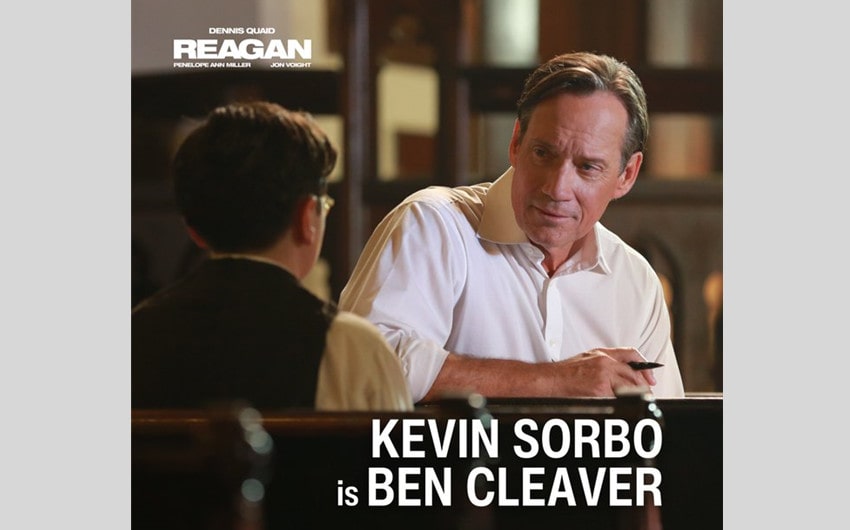
Image source: X
Kevin Dillon plays Jack Warner, the influential Hollywood studio executive who played a significant role in Reagan’s early acting career. Dillon’s performance captures the larger-than-life personality of Warner and his influence over Reagan’s transition from a rising actor to a box office star.
This portrayal adds a layer of historical context to the film, illustrating the intersection of Reagan’s Hollywood roots with his eventual political aspirations.
Historical Accuracy vs. Artistic Interpretation
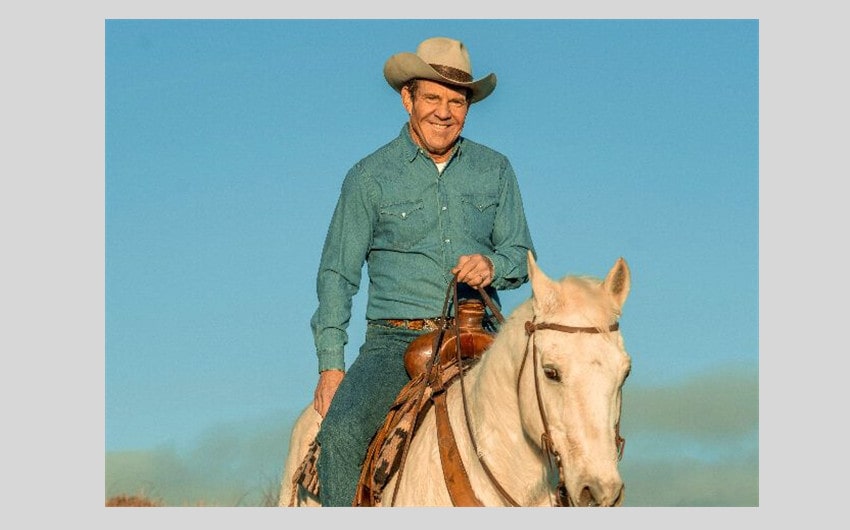
Image source: Pinterest
The film Reagan seeks to provide a cinematic journey through Ronald Reagan’s life, blending factual events with artistic liberties. While it covers several milestones, the film’s approach to storytelling has drawn attention for its mix of accuracy and creative interpretation.
Artistic Interpretations and Omissions
Narrative Framing: The story is uniquely told from the perspective of Viktor Petrovich, a fictional KGB agent. This creative choice provides an external viewpoint on Reagan’s life but has sparked debate about its effectiveness. Critics argue that using a fictional character may oversimplify or dramatize the nuances of Cold War geopolitics.
Selective Storytelling: The film emphasizes Reagan’s successes and avoids delving into some of his more controversial moments, such as the Iran-Contra affair and the government’s response to the AIDS crisis. These omissions have led some to view the film as overly reverent, portraying a sanitized version of Reagan’s presidency.
Reception of Historical Accuracy
Critics have praised the film for accurately depicting key events, such as Reagan’s speeches and his relationship with global figures like Mikhail Gorbachev. However, others have noted that the film glosses over the complexities of his policies, favoring a narrative of heroism and triumph.
Critical and Public Reception
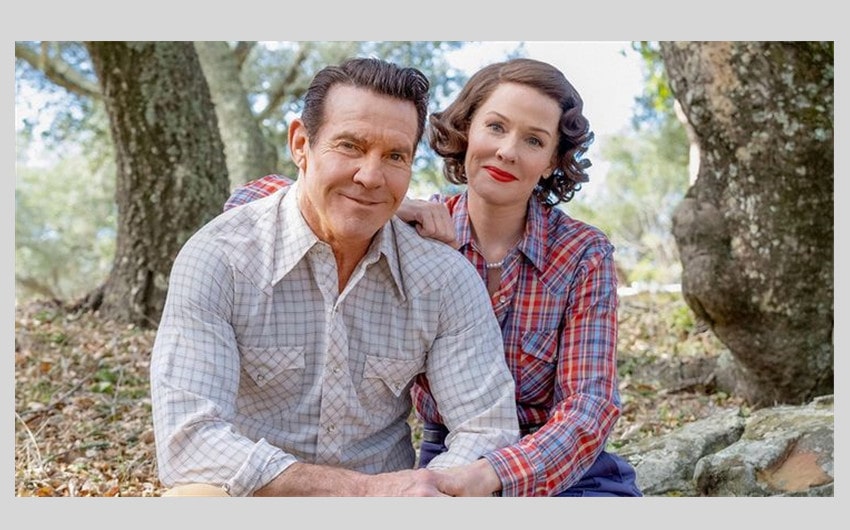
Image source: Pinterest
The reception of Reagan has been deeply polarized, reflecting the film’s ambitious attempt to blend historical storytelling with biographical drama.
Critical Reception
- Rotten Tomatoes: Critics have given the film an 18% approval rating, indicating overwhelmingly negative reviews. Many argue that the film lacks nuance and feels more like a tribute than a balanced biopic.
- The Atlantic: This publication describes the movie as “hero-worship,” critiquing it for its shallow exploration of Reagan’s life and decisions.
- Vulture: The film has been labeled as “overly simplistic,” reducing Reagan to a one-dimensional figure rather than exploring the complexities of his personal and political struggles.
- RogerEbert.com: The review suggests that the film fails to deliver a compelling narrative, relying too heavily on surface-level storytelling rather than providing deeper insights.
Public Reception
- Audience Scores: Despite critical backlash, the film has resonated with general viewers, holding a 98% audience approval rating on Rotten Tomatoes. Fans praise its portrayal of Reagan as an inspiring leader and the emotional resonance of key scenes.
- Box Office Performance: The film has performed well commercially, grossing $30.1 million globally by October 2024. Its strong opening in U.S. theaters reflects its appeal in regions with a historically positive view of Reagan’s presidency.
- Audience Sentiment: Many viewers have praised the performances of Dennis Quaid and Penelope Ann Miller, as well as the film’s ability to highlight Reagan’s optimism and determination.
The Divide Between Critics and Audiences
The stark contrast between critical reviews and audience reactions has sparked discussions about the film’s intent. Critics suggest it overly glorifies Reagan’s legacy, while audiences appreciate the focus on his achievements and leadership. This divide highlights the challenges of creating a biographical film that appeals to both skeptics and admirers.
Featured image: Pinterest.com

